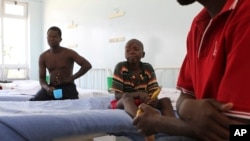Scientists say a strain of typhoid that is resistant to antibiotics has become the dominant strain of the infection in many parts of Africa and East Asia.
The research, published in the journal Nature Genetics, involved sequencing more than 1,800 samples of typhoid bacteria from 63 countries. It said one drug resistant strain of the bacteria, called H58, was found in 47 percent of all the samples that were analyzed.
Scientists say the strand emerged in South Asia in the 1970s and spread to other parts of Asia as well as East and South Africa. They also found evidence of a recent wave of transmissions in Africa.
Typhoid is caused by a bacteria called Salmonella typhi, and is spread through food and water that is contaminated with feces or urine.
The World Health Organization estimates that more than 20 million people are infected with typhoid every year, with at least 200,000 people dying of the bacteria.
Typhoid is usually treated using antibiotics. A vaccine has been developed, but it does not work in all cases, and it is not widely available in many countries.
One of the study's authors, Kathryn Holt, from the University of Melbourne, Australia, said drug-resistant typhoid "has been coming and going since the 1970s." She said that in the H58 strain, "these genes are becoming a stable part of the genome, which means multiple antibiotic resistant typhoid is here to stay."
The scientists called for increased surveillance of the H58 stain, as well as cutting back on the inappropriate use of antibiotics, improving sanitation in poor countries, and expanding vaccination programs.
Symptoms of typhoid include fever, headaches, abdominal pain, pink spots on the chest and liver complications.





